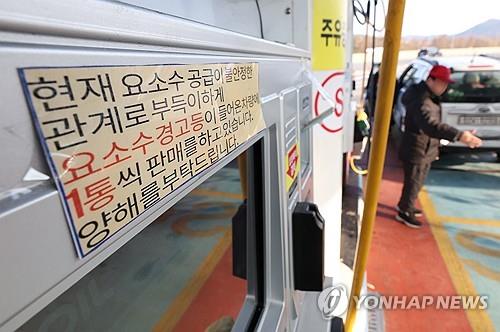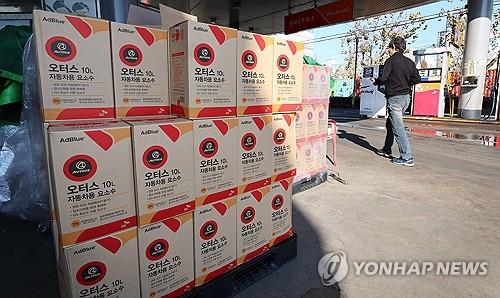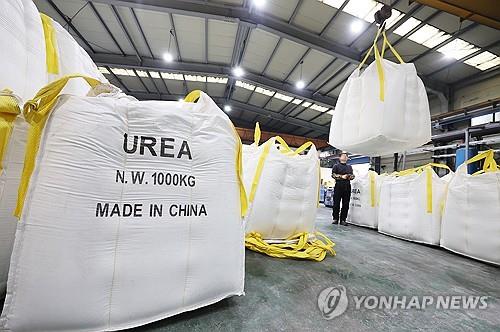- California Assembly OKs highest minimum wage in nation
- S. Korea unveils first graphic cigarette warnings
- US joins with South Korea, Japan in bid to deter North Korea
- LPGA golfer Chun In-gee finally back in action
- S. Korea won’t be top seed in final World Cup qualification round
- US men’s soccer misses 2nd straight Olympics
- US back on track in qualifying with 4-0 win over Guatemala
- High-intensity workout injuries spawn cottage industry
- CDC expands range of Zika mosquitoes into parts of Northeast
- Who knew? ‘The Walking Dead’ is helping families connect
S. Korea to double state urea inventory, release reserves over China’s export halt
South Korea decided to double the state inventory of urea for diesel vehicles to 12,000 tons and to release the current government reserves amid concerns over another urea supply crisis following China’s recent export halt, the finance ministry said Wednesday.
The government also called on gas stations and distributors of urea solution to set a purchase limit to prevent panic buying, while vowing to have active consultations with China to resolve the issue, though South Korea has urea inventory sufficient for 3.7 months, according to the Ministry of Economy and Finance.
Last week, China suspended customs procedures for urea shipments to South Korea. Seoul officials have said the move appears to have been made due to tight supplies for domestic use in China, though it was not a formal export curb.
Urea is a type of nitrogen used to curb emissions in diesel cars and to make agricultural fertilizers, and China is the world’s largest producer of the material.

During a meeting of the pan-government task force on key economic security items Wednesday, the government decided to double the state inventory of urea used for vehicles to 12,000 tons, enough for domestic use for two months, at an early date.
It also plans to provide some 2,000 tons of reserves with companies experiencing tight supplies.
“We’ve been closely monitoring the market situation, and no major disruptions have been reported in terms of urea supplies and prices, though some smaller and online distributors have reported shortages,” a ministry official said.
The government is in consultation with domestic urea solution producers to boost inventories, and is expected to sign a contract as early as next week.
It also plans to ask for efforts by sellers of urea solution, as well as truck drivers, to prevent a supply crisis, such as implementing a purchase limit on a voluntary basis.
“Most gas stations have already allowed customers to only buy up to three bottles of urea solution per purchase, and we think such measures will be helpful for some time,” the official said.
Major companies have already secured alternative suppliers and are able to have additional shipments so that any repeat of the urea supply crisis seen in 2021 is unlikely, according to officials.
In 2021, South Korea suffered major disruptions to urea supplies, as China halted its exports amid a trade dispute with Australia.

The finance ministry also presented a set of measures to reduce the country’s heavy dependence on China.
According to government data, South Korea imported more than 90 percent of urea for industrial purposes from China this year, rising from 71.8 percent the previous year.
The proportion of Chinese urea for fertilizers also rose from 18.3 percent in 2022 to 22.5 percent this year, the data showed.
For the goal, the government is reviewing giving subsidies to companies that seek to diversify supply channels of urea.
“Our reliance on China for industry urea had fallen to about 70 percent last year after the supply crisis in 2021. But companies, particularly smaller ones, again resorted to imports from China as the chemical from China is cheap, given logistics expenses, among other reasons,” an industry ministry official said.
“Solutions in structural terms are now needed, and the government will discuss the issue with companies to hedge against risks,” the official said.
Some 26 billion won (US$19.8 million) from the budget per year is expected to be required for the subsidies for urea supplies for industrial purposes, he added.
South Korea brings in urea from Qatar, Vietnam, Indonesia and Saudi Arabia, in addition to China, and it can secure the imports from more than 12 nations, according to the industry ministry.
China is yet to give an official explanation to South Korea regarding the recent export delay, and the Seoul government vowed to continue close talks with China through various communication channels.
The Chinese side has said that it has recently experienced a shortage in urea supplies due to a fall in production and rising demand, officials here said.













